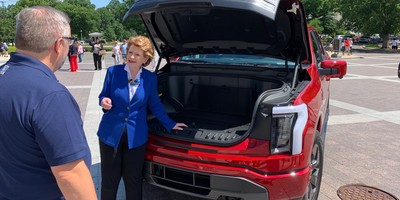Advertisement
The problem for my family—and millions of families like mine—is that new cars are expensive, and the government is making them more so. In fact, a recent report revealed that more stringent government regulations for cars’ fuel efficiency (what’s known as the “CAFE standard”) will raise the average cost of new automobiles by nearly $3,000. That will price millions of would-be buyers out of the new car market.
Those displaced potential car buyers will join my family in the used car market. The government’s new CAFE standard won’t directly impact used cars, but it will affect used car prices. That’s because the pool of used cars depends on people trading in their old cars when they upgrade: I have to hope, for example, that another large family with a car budget bigger than mine will purchase the latest minivan model and therefore want to sell me their old one.
The problem is that as the price of new cars goes up, people will hold on to their old cars longer. Therefore fewer used cars will be available, and less supply means higher used car prices. Those considering selling their old cars will also want to charge more because they’ll need extra cash for those higher, new car prices.
This is bad news for car dealers who will sell fewer new cars. It’s also bad news for the car manufacturers and their suppliers, all of whom will have less business and fewer jobs as a result. It’s bad news for families on a budget who need new cars, which also tend to be safer, and who will have less money left in their budgets after buying a car, regardless of whether it is new or used.
Recommended
Advertisement
Proponents of the more stringent CAFE standards insist that greater fuel efficiency will pay for itself eventually since drivers will spend less on gas. That may be the case years down the road: Families may ultimately recoup the extra thousands by shaving a little off the cost of each fill-up. Yet that isn’t much help to families struggling to make ends meet right now.
Government’s push for greater fuel efficiency is also done in the name of helping the environment by reducing greenhouse gas emissions. That’s a laudable goal of course, though Americans should be aware of the real tradeoffs for these “green” efforts: Emission may go down, but prices go up, and cars get smaller and generally less safe.
And sadly some “green” energy efforts seem to be more about politics, and less about actually helping the environment. The push for the greater use of ethanol, for example, has been advanced under the green flag, but actually has dubious environmental benefits. While the actual burning a gallon of ethanol results in less CO2 being released in the atmosphere than traditional gasoline, studies suggest that the process used to create ethanol (the use of fertilizers, farm and processing equipment, water, as well as the land itself, which is often first cleared of existing forests and plant life) more than off-sets those reductions, making ethanol mandates counterproductive from an environmental standpoint. That does deter politicians—eager to please the powerful corn and farming lobby—from keeping them in place.
Advertisement
The politics of big corn may have also helped fuel the EPA’s recent decision to green light using gasoline with up to 15 percent ethanol (rather than the current limit of blends with up to 10 percent). Previous studies had found that such a high concentration of ethanol damaged cars, as well as reduced fuel efficiency. The EPA hasn’t fully studied the issue, focusing instead just on the effect on emissions, but moved forward with allowing more ethanol anyway. That means that new car buyers may find that their more-expensive cars don’t last as long—another big blow to family budgets.
Americans care about the environment and want more energy solutions and products that reduce pollution. Yet it’s important to recognize the tradeoffs that often come with these “green” regulations and programs, which can leave American families poorer and less safe as a result.

























Join the conversation as a VIP Member